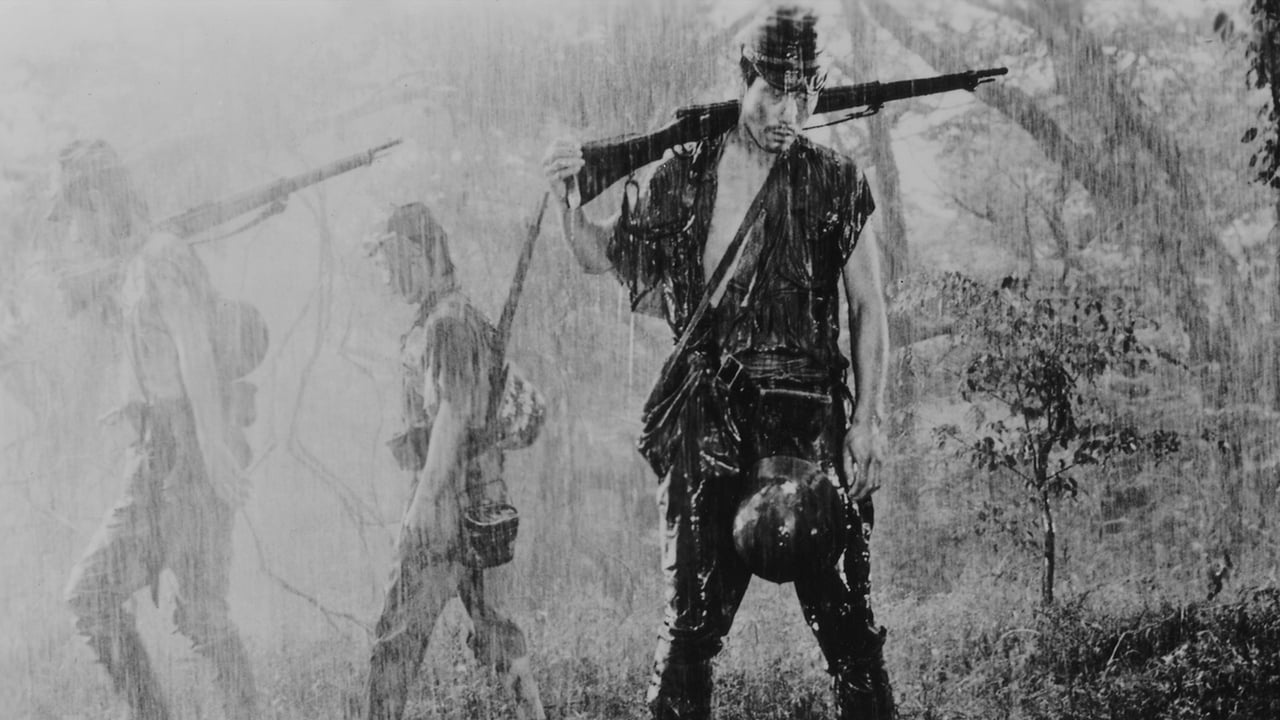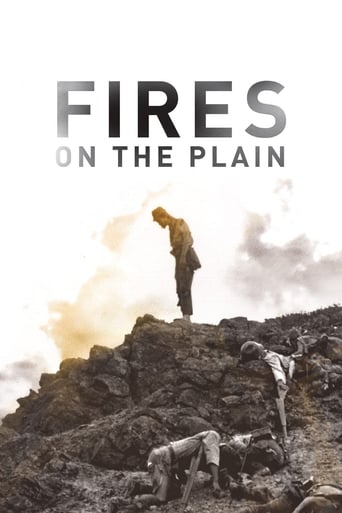

Viewed on Streaming. Restoration = ten (10) stars; cinematography = nine (9) stars; subtitles = eight (8) stars; score = seven (7) stars. Director Kon Ichikawa provides a grisly series of scenes depicting the hell of modern warfare for the abandoned, losing side as WWII is ending. The story, as such, is set in the Philippines (but exteriors are filmed in Southern Japan) and depicts three soldiers whose paths often cross while each is left to his own devices desperately trying to survive (moment-to-moment) and escape starvation. These protagonists are defeated and sick/injured infantrymen no longer (if ever) heroic or patriotic, but simply draftees looking for a way out of hell be it via: surrender (depicted by the Director as not an option offered by the Americans); suicide (often shown); or POW camp if found wounded, but still alive by American medics (suggested by the Director). There is another option: indefinably hiding and surviving on "monkey meat" in a jungle where there are no monkeys. The photo play is not so much a story as a strung-together collection of statements on the horrors of war in a semi-documentary format (see below). Here and there a bit of black humor emerges. Even in this hell hole, some culturally inculcated Japanese traditions survive, as depicted by Ichikawa, such as a semblance of politeness between those of the same (or unknown) rank. The three leading actors deliver excellent performances. Actor Eiji Funakoshi is a standout with "unusual" facial expressions that add greatly to the feeling of expect-the-unexpected as events unfold. The Director occasionally resorts to voice over for scene "clarification," but this low-cost expository crutch seems to diminish rather than enhance. The movie could benefit from some judicial re-editing. It is a bit too long, and drags now and then. Re-editing might also allow the impact of the film's war horrors to progressively build rather than continuously run flat out. (Viewers can become desensitized to subsequent war horrors having been exposed to so many packed into what has already occurred.) The fires (actually near-perfect vertical columns of smoke) are never fully explained (but some seem to be caused by farmers burning post-harvest waste). Also never fully explained is the film's ending. (Since two principal characters have already died, is the death of the third protagonist now required for symmetrical, loop-closing story reasons?) Cinematography (wide screen, black and white) and lighting are excellent. Ichikawa confidently and fully fills the wide screen providing an epoch, panoramic feel. Black and white photography lends a documentary polish and seems appropriate for the subject matter. The score initially adds to this epoch approach, but, unfortunately, is progressively diminished on the sound track as the film proceeds. Subtitles lengths and time-on-screen are excellent; text font seems to have been carefully selected to be especially easy to read (which is usually not the case in Japanese-language movies)! Highly recommended, but disturbing to watch. WILLIAM FLANIGAN, PhD.
... View MoreAn unflinching descent into psychological and physical oblivion that will undoubtedly burn images of the truthful brutality and suffering of war into your cerebral cortex in a way not many other films will. In fact, there is simply no other war film like it.Director Kon Ichikawa witnessed the unthinkable horror of Hiroshima first hand only 10 days after the bomb was dropped. He has said that from that day it would always be his mission to express the pointless, empty violence humans inflict on each other and themselves. Mr. Ichikawa shows us that there are no winners in war... for the paths to victory and defeat are paved with the same soldiers soullessly marching down roads which only have death and destruction at their end.Mr. Ichikawa succeeds in bringing his message to the world thru this haunting piece of cinema.
... View MoreThis is probably the greatest war film and certainly one of the greatest films. There's no sentimentality, no patriotic agenda, not even a hopeful message of universal brotherhood in this bleak glimpse of what we can only call hell. It's this quiet rigor and lack of manipulation that give the film its astounding power. There aren't any attempts to make a hero out of Ichikawa's protagonist Tamura either. He's just a poor doomed sap trying to stay alive in a world of horror who hopes, but isn't sure, he can hang on to his humanity in the process. Ichikawa's fierce lack of cant and illusion make Fires on the Plain stand alone. Ichikawa died February 2008.
... View More"Nobi" or "Fires On the Plain" is a film that is so excellent on so many levels, that not enough good things can be said about it. My only regret is that I was not able to see this 1959 film sooner.Being something of a film purist, I tend to look at films for their artistic merits based upon dialog, acting, photography and even the efforts to remain true to the period in terms of costume. Ultimately, I want to know if the film is "truthful" enough in revealing the human condition to make me think without oppressing me with what the director wants me to think."Fires on the Plain" is a great film because it crafts a portrait filled with realistic human reactions to the dying fires of a great historical catastrophe.Ichikawa's film is a condemnation of war on all levels -- as any good war film should be. War is horrifying, bloody, destructive. It is also murderous on the psyche. However, what is fundamental about "Fires on the Plain" is its unapologetic look at the Japanese soldiers. It shows them slowly collapsing under the weight of superior American firepower and their nation's inability to wage a war of its own making. A fatalistic code encouraging death before surrender is at the heart of this madness.I was astonished to see such an honest and brutally close look at the bitter fruits of Japan's military misadventure made just 14 years after the end of what the Japanese call the "Great Pacific War." Ichikawa, reveals what the Germans called the "war life," the plight of the common soldier.Ichikawa's film is interesting, since even today Japan is having a hard time fully coming to terms with its wartime fanaticism, its subjugation of conquered peoples, the racism of its war against the Chinese and war crimes which included cannibalism by soldiers and officers practiced not only against one another, but against Allied prisoners of war.Ichikawa produces a stark representation of the victimization of soldiers by a confluence of bad political decisions and cultural pressures.This stark examination is skillfully done by portraying the doomed soldiers as human beings who exhibit, at various times, fear, brilliantly laconic humor, dialog enriched by its sparseness, and a plot whose complexity is belied by the grim, wilderness setting.Ichikawa's portrait is a ragged and painful tapestry of defeated men. The tubercular Tamura, played as a woebegone and gentle soul by Eiji Funakoshi, is a good soldier who can't abandon his humanity, though he is as frightened and lost as his comrades. Before he departs for a hospital that will reject him as too healthy, Tamura is given a hand grenade by a superior who, recognizing the hopelessness of their situation, advises Tamura to kill himself.Why Tamura's hopelessly ill-supplied and militarily incapable unit was not ordered to surrender at the start of the film is telling. Ichikawa makes it plain that the war is over and everyone is merely waiting to die. As Tamura leaves his unit for his hopeless search for physical and spiritual salvation, he sees his comrades pointlessly digging an air raid shelter. They appear like corpses looking up from their own mass grave.We later watch as the overworked hospital's medical staff abandons the dying patients to an all-consuming American artillery barrage. The pathetic patients, who crawl from their huts in a vain attempt to survive, appear like pathetic, serpentine creatures dragging themselves from an omnipotent force. You know they won't survive.Ichikawa makes it plain that the only thing worse than a defeated army is one that has lost its honor by abandoning its humanity and its comrades. As Tamura staggers through the jungles of Leyte we encounter the noble, the dying and the exploitive. Cannibalism rears its ugly head as soldiers begin to eat one another rather than surrender to American "corned beef."When the men do talk of surrender, the propaganda of how Americans kills prisoners is countered by a worldly-wise soldier who reveals that the approaching Americans feed and care for prisoners of war because they, unlike the Japanese, respect brave soldiers who are forced to give up.It is the Japanese who intend to die fighting for the Emperor long after resistance has lost all meaning. Those willing to fight to the death will be killed. It is the calculus of war.After shooting a murderous and cannibalistic comrade, whom he earlier offered his own body to as food, the fatalistic Tamura's careless surrender also seems to be an intentional form of suicide. His death is a lonely image. Was Ichikawa trying to tell us of the internal conflict of the ordinary soldier who wants to live, but who is still trapped by his nation's suicidal cultural codes?If someone watches this film carefully, he or she will see that absolutism and fanaticism is the enemy. The Americans are portrayed as a technologically advanced people willing to employ that technology in the form of inexorable military power -- a lesson that transformed Japanese postwar society. Ichikawa's film isn't so shallow that it indicts America. Ichikawa indicts the sedimentary layers of Japan's destructive policies that created the war and then to continue it when all was lost.Ichikawa does not mention the nuclear weapons dropped upon Nagasaki and Hiroshima. He doesn't have to. The slow-motion destruction of the Imperial Japanese Army in the Philippines reveals the seeds of Japan's immolation.
... View More